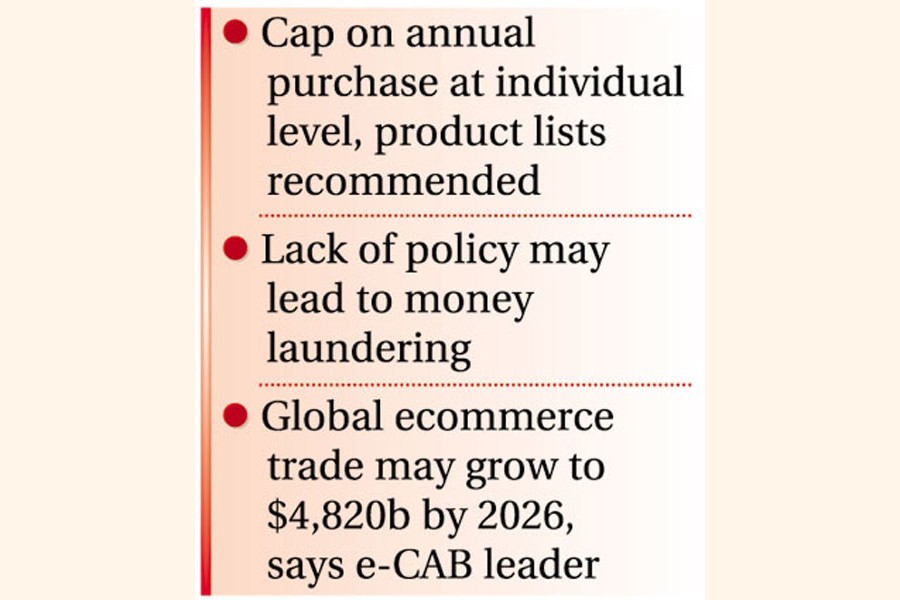The central bank has suggested preparing a state policy on cross-border ecommerce as stakeholders say Bangladesh misses billions in such untapped online trade in goods and services.
In its report to commerce ministry on modalities of the trade, the Bangladesh Bank (BB) has recommended fixing annual purchasing limit in individual level under the cross-border ecommerce trade.
Also recommended is making lists of digital contents including which will be purchasable and which not.
A committee headed by the director at foreign currency department of the BB submitted the suggestions after reviewing different aspects of such online offshore trade.
Earlier, the central digital cell under the commerce ministry had asked for preparing the report.
"We have received the suggestions and are working on it," says an official at the ministry who deals with the matter.
In the existing system, the exporting company has opportunity to conduct export activities through electronic declaration against orders received online by hosting products on ecommerce websites, the report says.
The BB has various instructions about sending money abroad against statutory import-or services sector-specific expenditure, taking into consideration the refund applicable to individuals and institutions, reads the report.
But, as there is no specific government policy regarding settlement of negotiated payments through third parties, no instructions have been issued by the BB either.
In this context, there is a need for policies at government level for importing goods and services through cross-border commerce, the central bank says in the suggestions.
Cross-border trade is operated through Export Policy, Import Policy Order, National API, Gold Policy 2018 (Amended)-2021 etc under the umbrella of the Import Export (Control) Act 1950.
Cross-border foreign transactions are conducted under the Foreign Exchange Regulation Act 1947 and the Guidelines for Foreign Exchange Transactions 2018.
According to an earlier meeting, a number of e-commerce platforms are currently operating cross-border trade through digital platforms, which may lead to money laundering in the absence of a proper policy.
The activities of hundi - an illegal cross-border money-transfer network - can be checked if a formal policy framework is put in place, the meeting had mentioned.
In the absence of a digital policy, the government has been losing huge revenue too, says a source.
"Besides, many are running ecommerce business activities staying abroad -- this is contrary to the ecommerce guidelines 2021," he adds.
E-Commerce Association of Bangladesh (e-CAB) Vice-President Mohammad Sahab Uddin mentions that earlier there was a huge potential for cross-border trade through companies.
"A proper policy can work wonders for the ecommerce sector," he says about the missed opportunity, adding that it would be possible to earn US$5.0 billion in foreign currency at this moment from cross-border trade.
Currently, global cross-border ecommerce market size is around US$1,000 billion, which will hover around US$4,820 billion by 2026, mentions Mr Sahab Uddin.
The main categories of cross-border ecommerce are entertainment and education, apparel and accessories, consumer electronics, home furnishing, personal care and beauty, healthcare and nutrition, footwear, food and beverage, digital wallet etc.
Currently, a number of issues plagued the cross-border ecommerce in Bangladesh. Advanced cross-border payments, including PayPal, are not accepted here.
There is no logistics support like air cargo, ship or land-based delivery ecosystem. Advanced education of global marketing, shipping or legalisation is also absent.
Besides, local manufacturers or entrepreneurs also face issues on how to use proper technology to process their goods, the document says.
Experts believe the cross-border ecommerce will have good impact on the country's different sectors. As a result, product quality will improve and employment opportunities will increase, they say.
Educational content and services, higher-value agriculture items after processing, pharmaceuticals, fish and meat, and textile items, among others, may be exported through ecommerce channels, says an entrepreneur.
The ecommerce sector is growing and the size of the industry currently hovers around Tk 16 billion.


